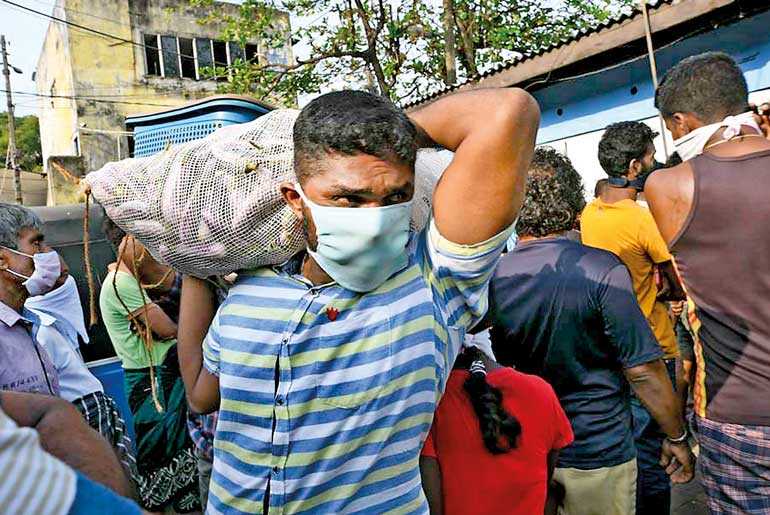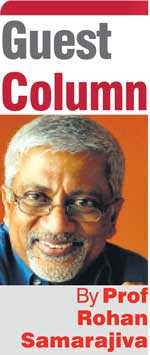Wednesday Feb 18, 2026
Wednesday Feb 18, 2026
Tuesday, 14 July 2020 00:01 - - {{hitsCtrl.values.hits}}

A shock such as the sudden lockdown of the entire country, enforced by a curfew, is likely to have exhausted the reserves of many daily wage earners and pushed them below the poverty line – Pic by Shehan Gunasekara
Multiple pandemics
The coronavirus-borne disease is not the only pandemic afflicting the world. It is accompanied by an infodemic of disinformation that is making a scientific response challenging. Anti-vaxxers may cause serious harm when a successful vaccine has been developed and is being administered to people across the world. Beyond all this is a pandemic of political leaders seeking autocratic powers. The World Health Organization is helping coordinate the response to the first two. We are on our own with the autocracy pandemic.
Hungary and the Philippines are examples of autocracy achieved through formal means. In Hungary, Viktor Orban, the Prime Minister since 2010, got the legislature to cede all its powers to him in the name of the coronavirus. He will decide when to give them back. Duterte of the Philippines got the legislature to give him three months of emergency authority and keeps asking for extensions. There are informal methods too. In India, the legislature was prorogued on 23 March on account of the pandemic and has not met since. Still within the law, but people are beginning to worry.
One may think that this is a reasonable course of action. Parliaments can be seen as distractions. Why listen to speeches from the opposition when there is work to be done? Parliament is all talk. What we need now is action.
But this is an overly simplistic and counter-productive perspective. The quality of decisions taken by autocrats who have dispensed with parliamentary oversight is poor. Announcing decisions and walking them back in days and weeks is not optimal. Failing to consider collateral effects of policy changes and having to scramble with patchwork solutions to remedy unintended negative outcomes is not the definition of efficiency.
Managing the economic fallout
The virus and the actions being taken to manage it are having massive effects on the world economy. According to the latest IMF World Economic Outlook: “Global growth is projected at -4.9% in 2020, 1.9 percentage points below the April 2020 World Economic Outlook (WEO) forecast. ... In 2021 global growth is projected at 5.4%. Overall, this would leave 2021 GDP some 6½ percentage points lower than in the pre-COVID-19 projections of January 2020.”
The Great Recession of 2007-09 is not comparable. What is comparable is the Great Depression of 1929 that stretched through the 1930s. I grew up thinking it was a distant event that led to the rise of fascism and the rescue of democracy in the US by Franklin Roosevelt. But the repercussions had been felt strongly in the less globalised and much smaller Ceylon (population of just over 5 million) of the day. Research by M.R.P. Salgado showed that even back then, we were vulnerable to demand collapse in export markets. The per capita GDP which was $ 80 in 1926 came down to $ 33 by 1932.
The impacts are expected to be severe in Sri Lanka’s present-day principal export markets, the US, UK and Europe. With unemployment likely to reach depression levels in those countries and Keynesian support payments tapering off, the prospects are not good for the recovery of demand for high-end apparel and tourism in these markets. These industries will have to pivot to new markets. Income and employment from labour exports will be radically destabilised.
According to Verite Research, 45% of households were affected by loss of daily wages because of the curfew. Severe effects were felt by 37% of households. How the combined effects of the curfew, the return of expatriate workers, the reduced remittances and pay cuts will play out remains to be seen. A shock such as the sudden lockdown of the entire country, enforced by a curfew, is likely to have exhausted the reserves of many daily wage earners and pushed them below the poverty line.
The collapse of demand in the apparel and tourist industries will cause even those with more stable income streams to be frugal, resulting in depressed demand for goods and services of all sorts which will continue to impact all sectors in the economy and push more of the near poor into poverty. Lots of people will lose jobs. The return of thousands of expatriate workers will reduce the spending ability of many households that relied on remittances and will drive down the price of labour.
In all, we will be looking at 1929-1940 type economic conditions, described by Nobel Laureate Robert Shiller as an economic downturn that was followed by a prolonged malaise. How best to manage the malaise?
Decision makers must have available to them multiple streams of information. Democracy, in addition to its many familiar attributes, is an information mechanism serving decision makers, be they political authorities or officials. As we pick through the causes of the delay in the reporting of the emergence of the pandemic in China’s Wuhan city, it is becoming clear that the lack of democracy in China was a contributory factor. The incentives governing the actions of the regional authorities resulted in a delay of days in reporting. The central authorities did not have good-quality information to act upon.
This is a narrative that helped explain the collapse of the central planning model implemented in the former Soviet Union. What happens at ground level is known to officials lowest in the hierarchy. They are subject to various incentives in terms of what they report to their superiors and what they do not. Do they get rewarded for high numbers or low numbers? How long will it take for falsifications to be discovered? Because of garbage data coming up, the Soviet state ended up a victim of garbage decisions.
Creating space for multiple streams of information is easier than creating the right incentives for officials. But this gives rise to the problem of assessing the quality of the information, of separating the wheat from the chaff. An internal culture of discussion, debate and information seeking is essential. Many see this as unproductive and time-wasting. But in conditions of imperfect information such as those we now live in, there is no alternative. Not just an active Parliament exercising its oversight functions diligently, but public hearings and consultations are needed. Active efforts to get out of bubbles and echo chambers are important.
Democracy, especially of the kind that we have in our country, is not perfect. Information flows within the state are distorted and incomplete. But the alternative based on task forces dominated by military mindsets is worse. These are the choices before us as we face the multiple pandemics.